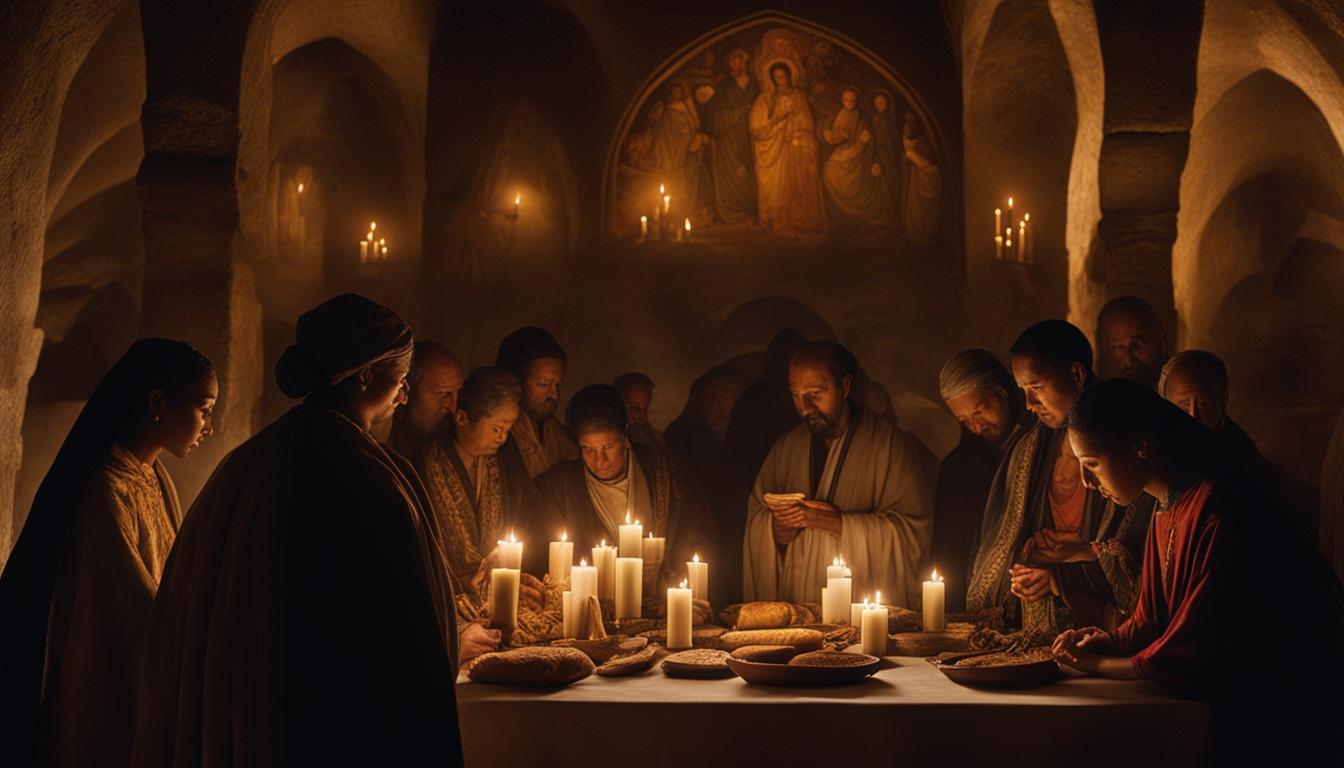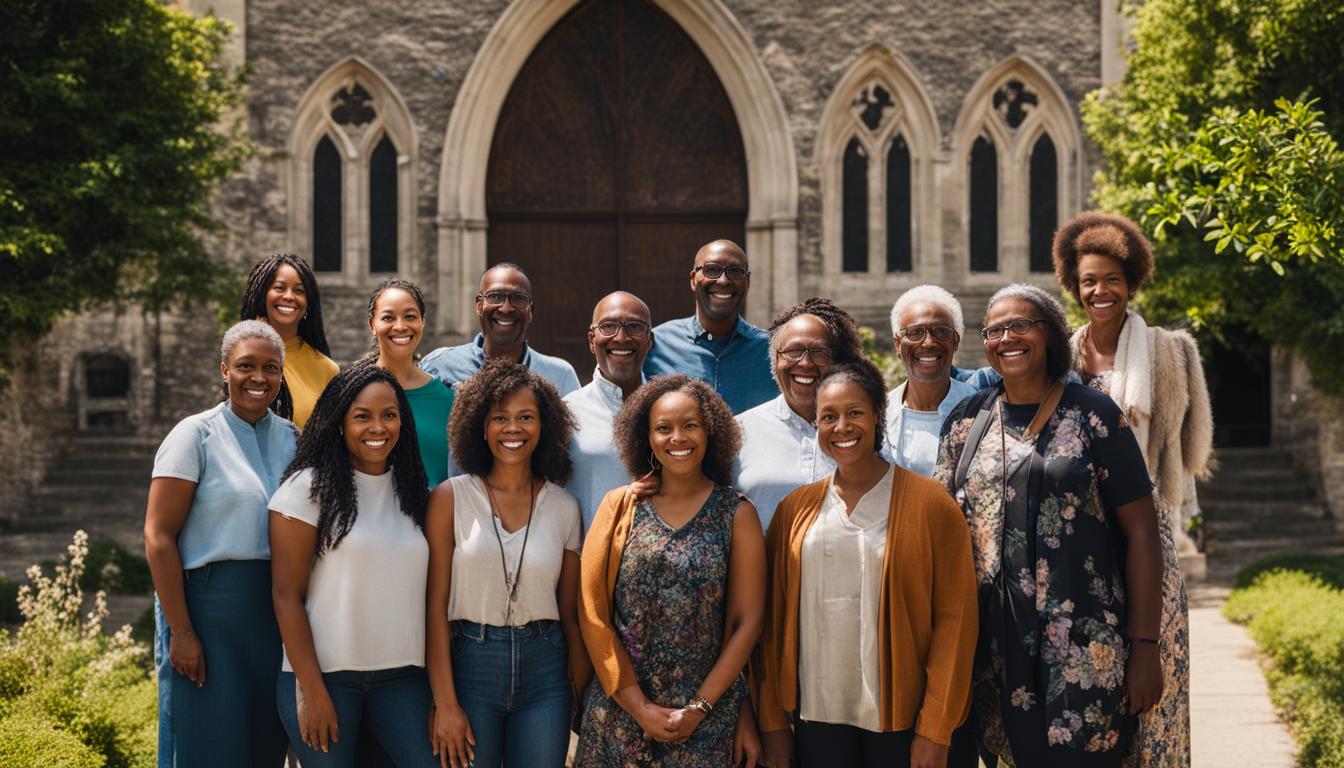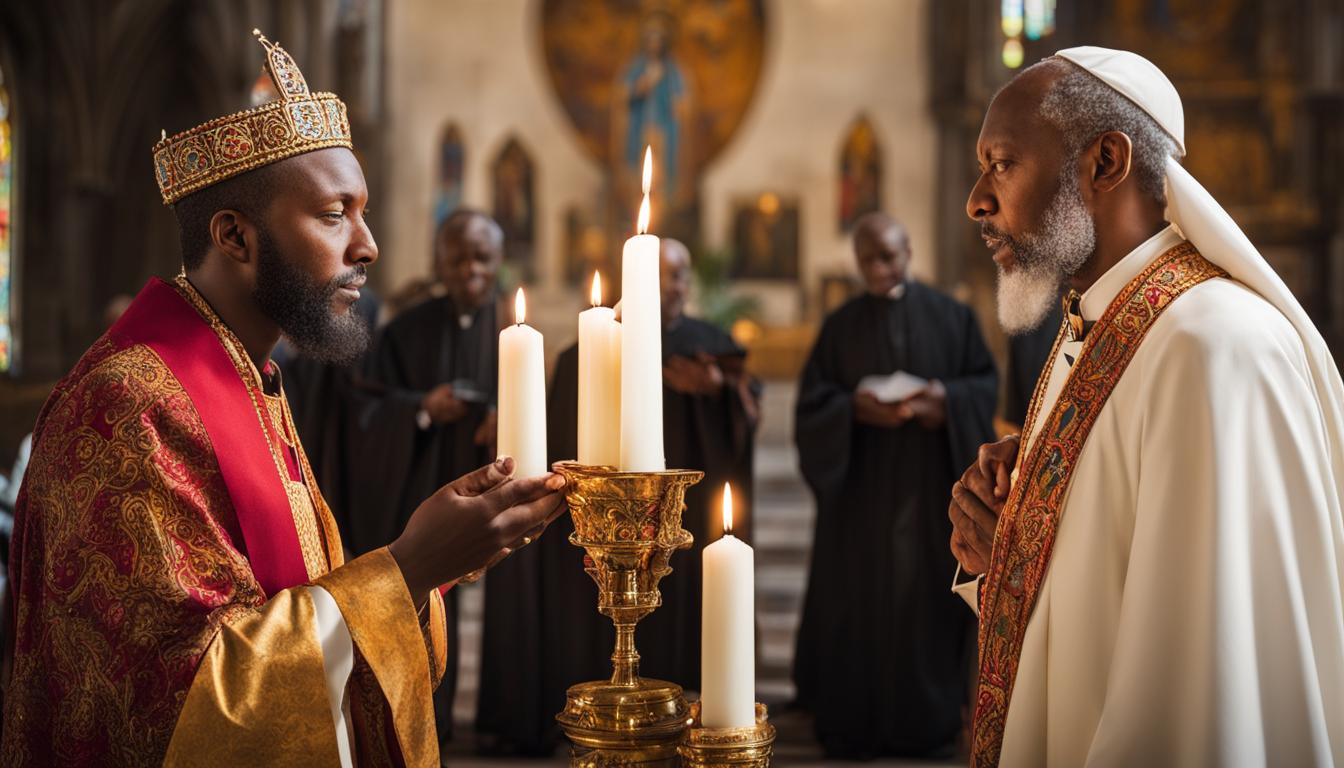Welcome to our article on church roles! In this comprehensive guide, we will explore the different roles within the leadership structure of the church, including apostles, prophets, evangelists, pastors, and teachers. These roles, mentioned in Ephesians 4:11, play a vital part in the functioning and growth of the religious community.
Key Takeaways:
- Church roles, such as apostles, prophets, evangelists, pastors, and teachers, have unique functions and responsibilities within the religious community.
- Apostles serve as official representatives of Christ and were part of the foundation of the early Church.
- Prophets spoke under the direct leading of the Holy Spirit and communicated God’s revelation to the Church.
- Evangelists proclaim the good news of God’s grace and play a crucial role in reaching out to the unconverted world.
- Pastors and teachers provide care, guidance, and spiritual teaching to nurture the believers and equip them for ministry.
The Apostles
Apostles are an integral part of the church foundation and serve as official representatives of Christ. In Ephesians 2:20, the apostles are described as being part of the foundation of the early church. They were specifically chosen by Jesus and sent out as messengers to carry His message to the world. While the term “apostles” is commonly associated with the Twelve, it can also encompass others who were sent forth to proclaim the Gospel.
Apostles played a crucial role in establishing and spreading the teachings of Jesus Christ. They were witnesses to His resurrection and received direct instructions and equipping from Him. Through their ministry, the apostles laid the groundwork for the early church, establishing its doctrine and structure. They were entrusted with the authority to make decisions and guide the early believers in matters of faith and practice.
“The apostles are unique messengers chosen by Jesus Himself, serving as the foundation of the church and carrying His message to the world.”
The apostles’ role as official representatives of Christ is significant in understanding the authority and authenticity of the early church. With their firsthand experiences of Jesus’ teachings and miracles, they provided crucial guidance and leadership. Their teachings, writings, and testimonies formed the basis of the New Testament, which remains a crucial authority for Christians today.
| Apostles | Key Role |
|---|---|
| Peter | Preaching the Gospel and founding churches |
| Paul | Planting churches, teaching, and writing epistles |
| James | Leadership in the Jerusalem church |
| John | Writing the Gospel of John, epistles, and Revelation |
| Andrew | Bringing others to Jesus and preaching |
| Philip | Evangelism and baptizing |
The Prophets
The role of prophets holds a significant place in the foundation of the church. Prophets were individuals chosen by God and empowered by the Holy Spirit to communicate His revelations to the people of God. They served as mouthpieces of God, delivering messages of guidance, correction, and encouragement to the early Christian community.
What made the prophets unique was their direct leading of the Holy Spirit. Unlike other church roles, prophets did not rely on pre-existing scriptures but spoke under the direct inspiration of the Spirit. This characteristic set them apart as preachers without a Bible, delivering messages directly from God. Their prophetic utterances were considered authoritative and carried weight in guiding the church.
In contemporary times, the gift of prophecy has transitioned into the gift of teaching, where individuals with the ability to explain and apply the Scriptures effectively serve the church. While the role of prophets as direct recipients of divine revelation has ceased, the importance of teaching based on God’s Word remains steadfast in nurturing the faith and understanding of believers.
| Characteristics | Description |
|---|---|
| Anointed by the Holy Spirit | Prophets were chosen and empowered by the Holy Spirit to speak on behalf of God. |
| Communicated God’s Revelations | Prophets delivered messages of guidance, correction, and encouragement from God to the church. |
| Spoke without a Bible | Prophets relied on direct inspiration from the Holy Spirit rather than pre-existing scriptures. |
| Authoritative Utterances | The prophetic messages carried weight and were considered authoritative in guiding the church. |
The Evangelists
Evangelists play a crucial role in the church, as they are called to proclaim the gospel and spread the good news of God’s grace. They are equipped with the ability to effectively communicate the message of salvation through Jesus Christ to the unconverted world. With a deep passion for sharing their faith, evangelists tirelessly work to reach out to those who have not yet heard about Jesus, inspiring them to turn to the path of righteousness. Through their dedication and commitment, evangelists contribute to the growth and expansion of the church.
One of the key responsibilities of evangelists is to communicate the good news in a way that resonates with people from all walks of life. They have the ability to connect with different individuals and effectively communicate the message of salvation, tailored to each person’s unique circumstances. Whether through personal testimonies, public speaking, or the use of various media channels, evangelists use their gifts and talents to bring the hope of Christ to the world.
“The ultimate goal of evangelists is to see lives transformed through the power of the gospel. Their tireless efforts to proclaim the good news not only impact individuals but also contribute to the overall mission of the church. Evangelists serve as catalysts for spiritual revival, igniting a passion for faith in the hearts of those who are searching for meaning and purpose.”
The work of evangelists is an integral part of the church’s mission to make disciples of all nations. By boldly proclaiming the gospel and sharing the love of Christ, evangelists bring people into a personal relationship with God and guide them on the path of salvation. Their dedication to spreading the good news is essential for the church to fulfill its calling and impact the world for Christ.

Table
| Key Attributes | Role | Responsibilities |
|---|---|---|
| Persuasive communication skills | Proclaim the gospel | Spread the good news of God’s grace |
| Passionate about evangelism | Connect with diverse individuals | Effectively communicate the message of salvation |
| Ability to inspire and motivate | Guide individuals towards faith | Lead people to a personal relationship with God |
The Pastors and Teachers
Pastors and teachers play vital roles in the church, providing essential guidance and instruction to the congregation. As shepherds, pastors have the responsibility of caring for the spiritual well-being of the members, nurturing their growth and providing support during challenging times. Through pastoral counseling, sermons, and personal interactions, pastors offer comfort, encouragement, and biblical guidance to help individuals navigate their faith journeys.
Teachers, on the other hand, focus on imparting knowledge and understanding of God’s Word. They play a crucial role in educating the members about the core beliefs, principles, and doctrines of Christianity. Through Bible studies, Sunday school classes, and other educational programs, teachers equip the congregation with the necessary tools to deepen their understanding of Scripture and apply it to their daily lives.
Furthermore, pastors and teachers work hand in hand to ensure the spiritual growth and development of the church. While pastors provide the pastoral care and leadership, teachers support them by providing sound biblical teaching and doctrinal instruction. Together, they create an environment where believers can grow in their faith, develop their spiritual gifts, and actively participate in the ministry of the church.
| Role | Responsibilities |
|---|---|
| Pastors | Shepherding the congregation, providing spiritual guidance and support, leading worship services and ceremonies. |
| Teachers | Imparting biblical knowledge and understanding, conducting Bible studies and educational programs, equipping the congregation for ministry. |
The Importance of Church Roles
Church leadership encompasses a variety of ministry positions that are essential for the effective functioning and growth of the church. These roles, including apostles, prophets, evangelists, pastors, and teachers, bring unique spiritual gifts, responsibilities, and insights to the community of believers. Understanding and recognizing the importance of these church roles is vital in fulfilling the church’s responsibilities and mission.
The diverse nature of church roles allows for a comprehensive approach to ministry. Apostles serve as the foundation of the church, establishing its core principles and guiding its growth. Prophets, inspired by the Holy Spirit, provide direction, revelation, and spiritual insight needed for the church’s continued development. Evangelists play a crucial role in reaching out to the world with the message of salvation, proclaiming the good news of God’s grace. Pastors and teachers, on the other hand, shepherd and instruct believers, providing guidance, care, and spiritual teaching to nurture their faith.
By embracing these various church roles, the leadership team equips the saints, edifies the body of Christ, and ensures the unity and maturity of believers. Each role contributes to the overall spiritual growth, well-being, and effectiveness of the church. It is through the collaboration and utilization of different gifts and perspectives that the church can fulfill its responsibilities to impact the world for Christ.
The Importance of Spiritual Gifts in Church Leadership
In addition to recognizing the significance of church roles, it is essential to acknowledge the importance of spiritual gifts in carrying out these responsibilities. Spiritual gifts are God-given abilities that enable individuals to serve and minister to others effectively. Each church role is accompanied by specific spiritual gifts that equip leaders to carry out their duties.
For example, some common spiritual gifts associated with church leadership include leadership, teaching, wisdom, discernment, and shepherding. These gifts empower leaders to guide, instruct, and care for the people of God. By utilizing their spiritual gifts, church leaders can effectively fulfill their responsibilities, contributing to the overall health and growth of the church.
| Church Role | Spiritual Gifts |
|---|---|
| Apostles | Leadership, vision, discernment |
| Prophets | Prophecy, wisdom, discernment |
| Evangelists | Evangelism, faith, encouragement |
| Pastors | Shepherding, teaching, empathy |
| Teachers | Teaching, knowledge, wisdom |
Understanding and nurturing these spiritual gifts within church leadership is crucial for the effective functioning of the body of Christ. By recognizing and utilizing these gifts, leaders can better serve and minister to the church community, fulfilling their responsibilities with excellence and impacting lives for the glory of God.
The Function of Church Roles
In accordance with Ephesians 4:12, the church roles have a fundamental function in equipping the saints for ministry and building up the body of Christ. Each role serves a specific purpose and contributes uniquely to fulfilling this function.
The Role of Apostles:
Apostles lay the foundation of the church, serving as official representatives of Christ. They carry His message to the world, spreading the Gospel and establishing the early Church. While commonly associated with the Twelve, the term “apostles” can include others who were sent forth to proclaim the Good News.
“For no one can lay any foundation other than the one already laid, which is Jesus Christ.” – 1 Corinthians 3:11
The Role of Prophets:
Prophets were also part of the foundation of the Church. They spoke under the direct leading of the Holy Spirit, communicating God’s revelation. Their messages served as a source of guidance, direction, and encouragement to the early believers.
“Surely the Sovereign Lord does nothing without revealing his plan to his servants the prophets.” – Amos 3:7
The Role of Evangelists:
Evangelists are commissioned to spread the Gospel to the unconverted world, proclaiming the good news of God’s grace. Their role is essential in reaching out to those who have not yet heard about Jesus and inviting them into a relationship with Him.
“Go into all the world and preach the gospel to all creation.” – Mark 16:15
The Role of Pastors and Teachers:
Pastors and teachers have the responsibility of shepherding and instructing God’s people. They provide care, guidance, and spiritual teaching, nurturing the believers’ faith and helping them grow in their understanding of God’s Word.
“Shepherd the flock of God that is among you, exercising oversight, not under compulsion, but willingly, as God would have you; not for shameful gain, but eagerly.” – 1 Peter 5:2
The Importance of Church Roles:
The various church roles function together, creating a balanced and holistic approach to equipping the saints and building up the body of Christ. Each role brings unique gifts, insights, and responsibilities, contributing to the overall mission and ministry of the church.
Now let’s take a closer look at the function and importance of unity and collaboration among these church roles.
The Need for Unity and Collaboration
In order for the church to effectively fulfill its mission and impact the world for Christ, there is a crucial need for unity and collaboration among the various church roles. Unity in the church creates a strong foundation and fosters a sense of belonging among the members. When the body of Christ works together, leveraging the unique gifts and functions of each church role, it becomes a powerful force for spreading the gospel and building up the body of believers.
Collaboration among church roles brings together diverse perspectives, experiences, and abilities, leading to innovative ideas and approaches to ministry. By pooling their resources and talents, church leaders and members can achieve far greater results than they could on their own. Collaboration also promotes mutual respect, humility, and a recognition of the complementary nature of each role. When apostles, prophets, evangelists, pastors, and teachers work together in harmony, they create an environment where individuals can grow in their faith, find support and guidance, and experience the transformative power of God’s love.
The Power of Collaboration
“The effectiveness of the church is not based on the prominence of a single role, but rather on the collective efforts and collaboration of all the roles. Each role contributes in a unique way, and together they form a complete and balanced leadership structure. It is through unity and collaboration that the church can truly fulfill its purpose and impact the world for Christ.” – Pastor Sarah Johnson
Working together in unity and collaboration also promotes accountability and accountability to God, as each church role supports and encourages one another in fulfilling their responsibilities. The strengths of one role can compensate for the weaknesses of another, creating a dynamic synergy that propels the church forward. When leaders and members of the church embrace unity and collaboration, they model the love and grace of Jesus Christ to the world, attracting others to the faith and creating a vibrant and thriving community of believers.

Conclusion
In conclusion, understanding and embracing the various church roles, including apostles, prophets, evangelists, pastors, and teachers, is crucial for the ministry and growth of the church. Each role brings unique gifts and functions that contribute to the overall mission of the church.
Unity, collaboration, and a commitment to the proper use of spiritual gifts are essential for the church to fulfill its purpose and impact the world for Christ. It is important for leaders and members of the church to recognize and appreciate the gifts and contributions of others, fostering a spirit of cooperation and mutual respect.
By working together and utilizing their spiritual gifts, church ministries can effectively equip the saints, edify the body of Christ, and ensure the unity and maturity of believers. The church leadership, consisting of apostles, prophets, evangelists, pastors, and teachers, plays a vital role in guiding and nurturing believers, helping them grow in their faith.
FAQ
What are the roles within the leadership structure of the church?
The church has different roles within its leadership structure, including apostles, prophets, evangelists, pastors, and teachers.
What is the role of apostles in the church?
Apostles are special messengers sent out by the Lord Jesus to carry His message to the world. They serve as official representatives of Christ and were part of the foundation of the early Church.
What is the role of prophets in the church?
Prophets were also part of the foundation of the Church and spoke under the direct leading of the Holy Spirit. They communicated God’s revelation and were often considered preachers without a Bible, as their messages came directly from the Spirit.
What is the role of evangelists in the church?
Evangelists are called to carry the message of the gospel to the unconverted world. They are equipped with the ability to effectively communicate the good news of God’s grace as seen in Jesus Christ.
What is the role of pastors and teachers in the church?
Pastors and teachers are responsible for shepherding and instructing the people of God. They provide care, guidance, and spiritual teaching to help believers grow in their faith.
Why is understanding church roles important?
Understanding and recognizing the various church roles is important for the overall functioning and growth of the church. Each role brings unique gifts and insights that contribute to the ministry and mission of the church.
What is the function of church roles?
The function of church roles is to equip the saints for the work of ministry and to build up the body of Christ. Each role serves a specific purpose in fulfilling this function.
Why is unity and collaboration important among church roles?
In order for church roles to function effectively, it is essential for there to be unity and collaboration among the leaders and members of the church. Ephesians 4 emphasizes the importance of maintaining unity and working together towards the common goal of building up the body of Christ.
What is the conclusion about church roles?
Understanding and embracing the various church roles, including apostles, prophets, evangelists, pastors, and teachers, is crucial for the ministry and growth of the church. Each role brings unique gifts and functions that contribute to the overall mission of the church. Unity, collaboration, and a commitment to the proper use of spiritual gifts are essential for the church to fulfill its purpose and impact the world for Christ.

















I don’t think the title of your article matches the content lol. Just kidding, mainly because I had some doubts after reading the article.
Thank you for your sharing. I am worried that I lack creative ideas. It is your article that makes me full of hope. Thank you. But, I have a question, can you help me?